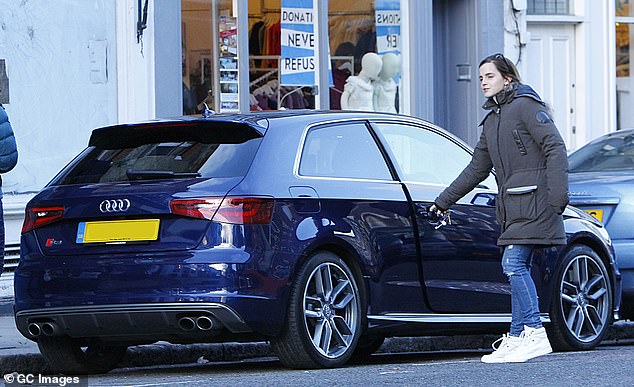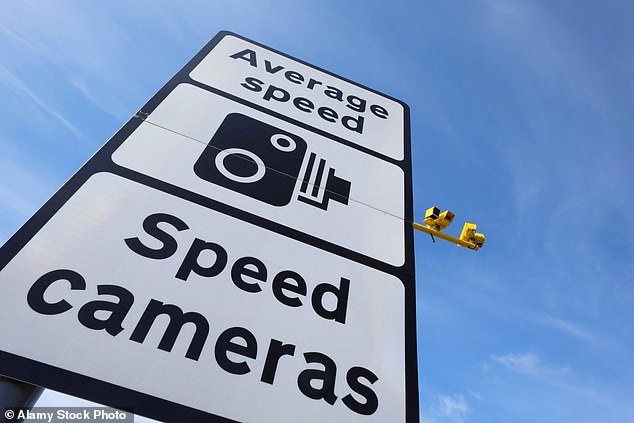Earlier this week I found myself in the dock of a London court receiving the news that for the first time in my fiftysomething years I now have a criminal conviction.
This would be a horrifying enough moment for anyone who, like me, prides themselves on being an upstanding member of society – but on this occasion my humiliation and distress was matched by a searing anger.
For the ‘offence’ that had brought me to face a magistrate was not theft or physical violence.
It was speeding – even if that word feels woefully inappropriate to describe driving four miles over the limit on a major thoroughfare now designated, like so many streets in London, a 20 mph zone.
But speeding is what the law decrees it is. And having been caught on camera on four separate occasions in the past year, driving at between just four to six miles over this ludicrously low limit, I have now been banned from driving for six months.
No matter that on each occasion the ‘offence’ took place on the same road leading to the hospital where my elderly father, for whom I am the sole carer, lay desperately ill – on two of those occasions, so ill I was told his life was hanging in the balance.
No matter either that I will now have to rely on already perilously overstretched NHS transport services to ferry my father to and from his multiple appointments. Or that without a car we cannot undertake the little jaunts that lift his spirits and feed into the local economy.
The law has spoken, and it has determined that this middle-aged carer is a driver so dangerous that she must be taken off the roads at all costs, burdened with a driving ban that leaves me too ashamed to fully identify myself, even if I disagree vehemently with its cause.
Meanwhile, all around us, dangerous boy racers hurtle down side streets at 60 mph, or along motorways at twice that speed, terrorising pedestrians and other motorists and risking lives.
Balaclava-clad cyclists on e-bikes jump traffic lights and junctions without sanction. But no, it is the harried middle classes, inadvertently going a few miles per hour over the limit, who must feel the full weight of the law.
It’s one reason why I felt a great deal of sympathy this week for the actresses Emma Watson and Zoe Wanamaker, who have also both lost their driving licences. In Watson’s case it was for doing 38 in a 30 mph zone, and in Wanamaker’s for being caught driving 6 mph over the 40 limit.

Actress Emma Watson was this week banned from driving for six months for speeding

It is the harried middle classes, inadvertently going a few miles per hour over the limit, who must feel the full weight of the law
Even though they had an accumulation of points behind them, do either of these strike you as a genuine menace on the roads?
But then you have to wonder whether addressing dangerous driving is the real purpose of these draconian fines and bans – or whether our hard-up councils see these new, often stealthily imposed speed limits as a licence to print money.
It is hard not to, given that revenues from speeding fines have risen fivefold since 2019 – and that 20 mph speed limits were introduced on all roads within the central London Congestion Charging Zone in March 2020.
In tandem, the number of UK drivers banned from driving after accumulating 12 or more points has also risen to more than 140,000 UK motorists, an increase of 4 per cent since 2021.
The ratio of fines per car is of course much greater, with the Metropolitan Police reporting one speeding offence for every 4.8 cars in Greater London in 2022, according to research by Go.Compare. The good folk of Warwickshire and of Devon and Cornwall are even more likely to feel the long arm of the law, with one speeding offence per 4.58 and 4.64 cars, respectively.
On paper, of course, these statistics reflect a drive by government and local councils to create safer, less polluted transport networks and neighbourhoods – though I would argue that the widespread new imposition of 20 mph zones has created legions of frustrated drivers revving their engines, which does not help on either front.
Yet in reality, those often cynically positioned cameras seem to have proved a ruthlessly efficient way of boosting local council coffers, with little regard for the wider consequences for citizens.
Either way, no one is suggesting that those who don’t drive without due regard for the safety of others should not be at the receiving end of some sort of punishment. The question is how, and at what wider cost to society?
Certainly, the impact of my driving ban on my small household is distressing enough and, I believe, completely out of proportion.
For the past five years I have been sole carer to my father following my mother’s death from cancer. Now in his mid-80s, a stroke not long after Mum died left him with a litany of ongoing complications, among them a heart condition, low-level epilepsy and mild dementia.
After losing my job in marketing, I took the decision to dedicate myself to caring for him full time and moved into his small London home. Much of our time is taken up with medical appointments, many of them at the hospital nearest to us. It is here that all my ‘transgressions’ have taken place – on the major road that passes its front gate.
I wonder how many others, like me, have been caught going over 20mph as – adrenaline pumping, or battling multiple emotions – they race to see a loved one they’ve been told may die any minute?
In my case, one of my fines was a consequence of dealing with news that my father had suffered a potentially fatal haematoma.
I am not using this as an excuse: all of us have a duty to be safe drivers. But the reality is that the majority of people captured on that camera opposite the hospital are not acting like Lewis Hamilton. They are mostly people going about their lawful business, largely unaware that the speedometer has crept up a notch or two.
My car was also about so much more than hospital trips. I like to keep Dad active, and used my modest runaround to take him to the park, the cinema or to other activities that keep him inspired and motivated. I wonder what impact losing those for six months might have? We cannot use public transport, and taxis can be difficult. As his sole carer, meanwhile, the car has also been my passport to small freedoms of my own.
That passport has now been taken away following the letter that dropped on my doormat last December, informing me I’d been ‘caught’ doing 24 mph in a 20 zone.
As a consequence I had exceeded 12 points on my licence and faced losing it if I didn’t appeal. I replied that I did want to appeal, but would need a wheelchair for my father on arrival at the required court appearance. He could not be left home alone for long and would need to come with me.
Suffice to say, when we arrived at court this week, no wheelchair was provided, despite assurances. In addition, the distress of seeing his daughter in court was compounded for my father by the humiliation of soiling himself since the lack of wheelchair meant he could not access a bathroom.
Horrible enough, but it was all for nothing, as even after explaining that my car was vital to us, I was told my situation was not ‘exceptional’ enough to warrant mitigation.
So, in a heartbeat, the one thing that allows me to be a useful member of the community was taken away – all for driving at a speed limit six miles less than the 30 mph limit which was in place for decades until a panel of small-minded bureaucrats decided to dispense with it.
Justice? Or just another punishment meted out courtesy of cynical pen-pushers who have spotted an easy revenue stream, and who could not care less about the wider consequences?
I know what I think.
The author’s name has been changed.












